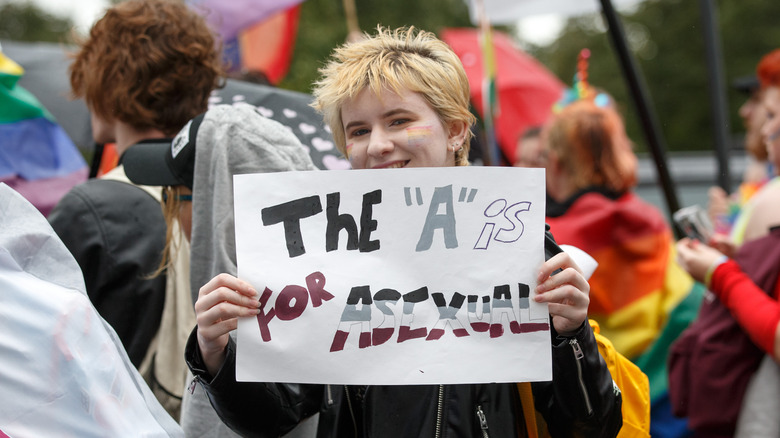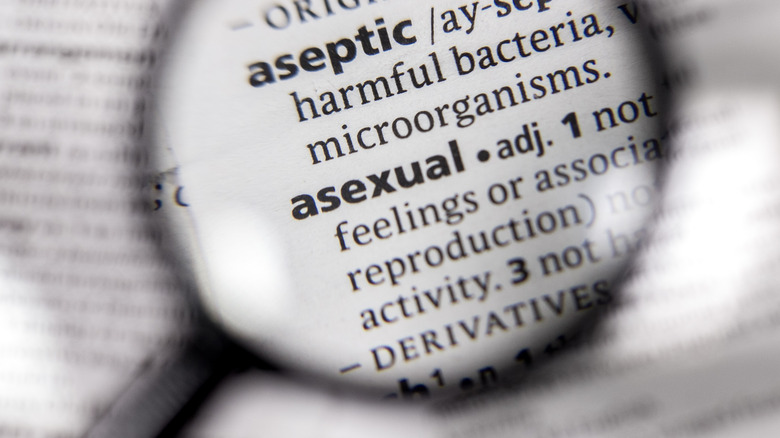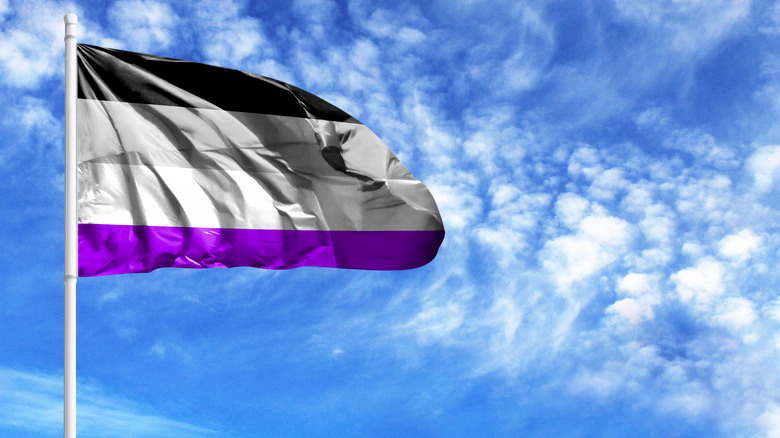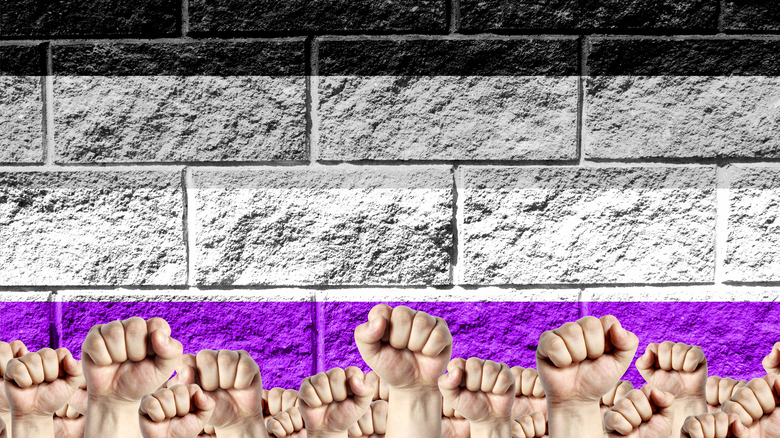Here's What It Really Means To Be 'Ace'
While we're all familiar with the LGBTQ+ acronym and all the shades of its rainbow, what does it mean when you see it written as LGBTQA+? Some interpret the "A" as standing for "allies," but supporting the rights of people of all orientations should be something we all do as a matter of course. Instead, as Thought Catalog points out, the "A" is meant to acknowledge a group that flies so far below the radar that many are not even aware of their existence: the "ace" community, composed of those who identify as being asexual to some degree.
The first thing we need to recognize about asexuality is that it is not the same thing as celibacy. Celibacy is a personal choice not to engage in sexual activity, maybe for religious reasons or because you're waiting for marriage, healing from a bad relationship, or just haven't met anyone you're interested in. On the other hand, asexuality, as the Trevor Project explains, is as much of a sexual orientation as being straight, gay, lesbian, or pansexual.
If you are asexual, you simply don't feel much interest in sex, although you may well desire a romantic relationship. While there are many ace couples in happy, sex-free partnerships, aces may face misunderstanding and even scorn from those who don't understand the orientation. Just as there is nothing wrong with having a sexual orientation that's not geared toward reproduction, neither is it wrong to prefer taking a pass on sex altogether.
'Ace' exists on a spectrum
Asexuality, as with all types of human sexuality, isn't always an all-or-nothing proposition, but instead exists along a spectrum. As it relates to sexuality alone, someone can either identify as completely asexual, meaning they do not experience any feelings of sexual attraction whatsoever, or as gray-A, which is akin to being demisexual in that sexual feelings may be experienced under certain conditions.
According to LGBTQ Nation, demisexual and gray-A aren't exactly the same thing, as demi is a specific orientation meaning people who only feel sexual within the context of a deep emotional connection whereas gray-A's are less defined. They're more "asexual-ish," and it's possible that a gray-A may engage in sexual activity now and then and sometimes they kinda sorta like it, but other times ... meh.
Asexuals and gray-A's can also fall anywhere on the romantic spectrum. At one end, they may be completely aromantic — Ace/Aros may be satisfied with platonic friendships, or they may not be big on companionship at all, but they do not have any pull towards forming romantic attachments. Aces can also be romantically attracted to people of the same gender (homoromantic), the opposite gender (heteromantic), both genders (biromantic), or people regardless of gender (panromantic).
The ace community has a flag but few role models
Ace awareness is growing to the point where the community even has its own black, gray, white, and purple flag. As Asexual Agenda explains it, the black stripe stands for asexuality; the gray stripe for gray-A; the white stripe (somewhat controversially) for allosexuals, meaning anyone who experiences sexual attraction of any type; and purple for the community as a whole. That being said, there's still little recognition of asexuality in popular culture and the media, expect perhaps as a negative stereotype about sex-hating prudes of the stereotypical "church lady" variety.
Of the very few celebrities who are either out as or widely assumed to be asexual, the most prominent ones as listed by Madame Noire include comedians Janeane Garofalo and Paula Poundstone, singer Morrissey, and "Project Runway" host Tim Gunn as well as historical figures Florence Nightingale and T.E. Lawrence (aka Lawrence of Arabia).
Famous fictional aces may include Sherlock Holmes, the Professor from "Gilligan's Island" (via YouTube), and Jughead from the Archie comics. According to a ComicBook interview with "Jughead" comic book writer Chip Zdarsky, Jughead may well be one of the very few characters whose asexuality is presented in a positive light. Zdarsky says, "It's good to have someone not as mired in the hormonal teen romances ... I like an asexual Jughead. That's more interesting to me."
How do you know if you're ace?
If you have been feeling out of step or as if maybe there's something wrong with you since you don't seem to share the same interest in sex as your friends or as portrayed in the media, it may come as a relief to know that ace is not an aberration, it's an identity equally as valid as LGBTQ+ or straight. You don't need to take a quiz or consult with a therapist to determine whether you're asexual, gray-A, or anywhere along the spectrum. LGBTQ Nation says that you, and only you, can determine what you identify as when it comes to both sexuality and romantic preference.
Perhaps you're not quite sure whether you're asexual, gray-A, or demisexual, or maybe you're not comfortable coming out just yet, and that's OK. If you do want to speak out and fly that black/gray/white/purple flag, though, you may experience some misunderstanding and resistance at first, but the important thing is for you to realize that you are what you are, and you are not alone. It's estimated that there are some 77 million aces throughout the world, and in time people will become more understanding and accepting of all types of sexuality (and asexuality) that may differ from their own.



